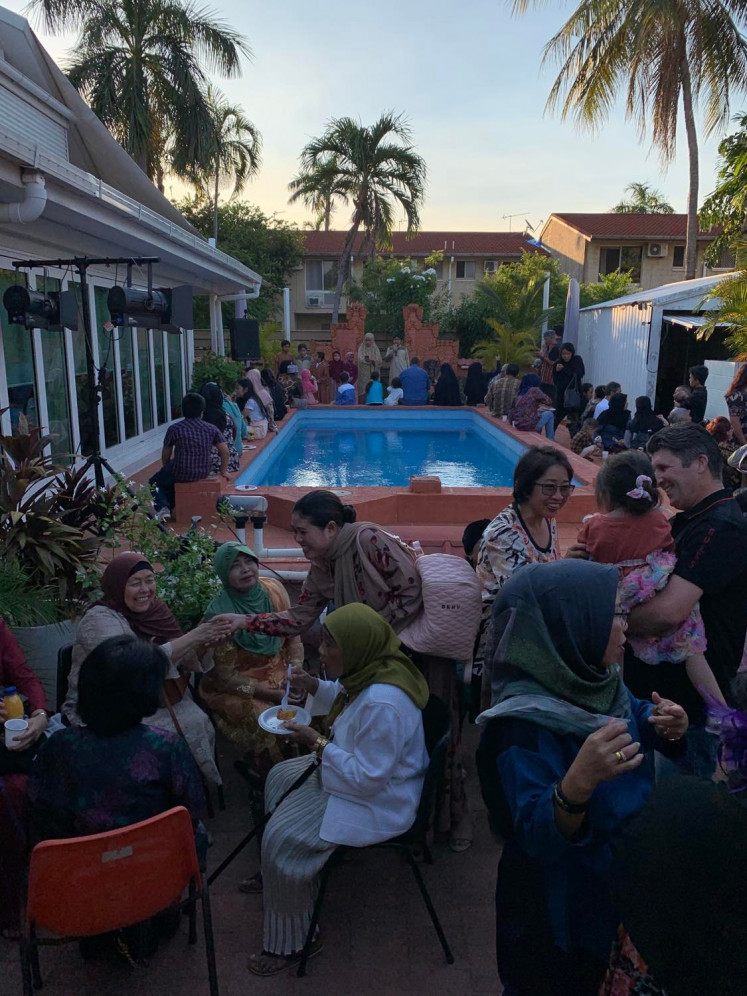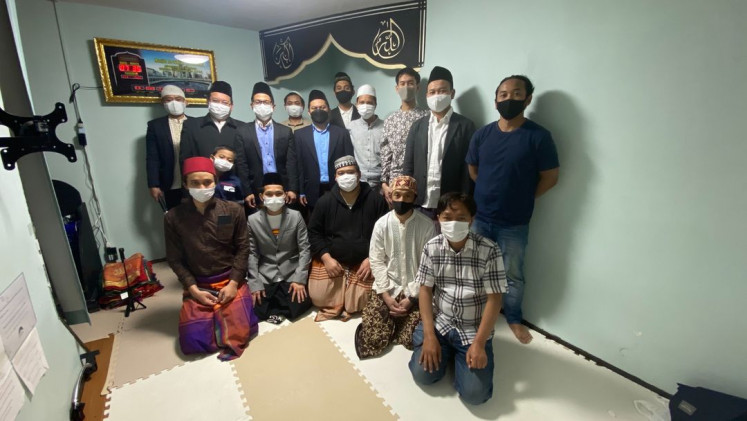April 4, 2022
JAKARTA – With the quarantine easing, Ramadan and Idul Fitri at home with family has become a reality.
Ramadan is highly associated with family gatherings, where relatives congregate to break their fast together in a warm, familiar environment. Because of border closures and lockdowns, this has been a challenge for many Indonesians in the past two years.
With more people vaccinated, traveling abroad is no longer restricted in most parts of the world and Indonesia also has eased its quarantine rules in many areas in Java and Bali. The government has also waived quarantine for all fully vaccinated foreign arrivals entering the country since March 22, as daily coronavirus cases have dropped more than 90 percent from a mid-February peak.
This means members of the Indonesian diaspora can finally plan on spending Ramadan and Idul Fitri in Indonesia.
Quarantine easing
Wawan Putra, who currently lives and works in Melbourne, Australia, as an Indonesian language teacher, plans on coming home after two years away. He will be able to spend time with his family in Bogor, West Java, and will not need to pay for pricey quarantine accommodation.
“I can’t wait to come home to see my little nephews and nieces. I have not seen them in person for a while,” he shared.
“Last December, my friends went home and paid at least AU$4,000 [$3,006] for quarantine,” he added. For Wawan, spending Ramadan in his home country will be special. The ambience and the joy of being face-to-face with loved ones cannot be replaced by Zoom calls.
“I cannot describe my feelings now but I am really excited to finally be able to see my family,” he said.

Living abroad: In 2021, Wawan Putra celebrated Idul Fitri along with other Indonesians at the Consulate General of the Republic of Indonesia in Darwin, Australia. (Personal Collection/Courtesy of Wawan Putra) (Personal Collection/Courtesy of Wawan Putra)
Some will use the opportunity to visit their loved ones’ graves, a regular part of Idul Fitri for many. Riska Lolita, who is originally from Surabaya, East Java, has been home since March 26 to celebrate Ramadan and Idul Fitri together with her family.
“It’s been a while since the last time I visited my parents’ graves. I don’t get to do this often because I live in Melbourne. I enjoy eating opor ayam [chicken stew with coconut milk] together with the family,”
Riska shared. Riska is not the only one. Yudha Dermawan is an international student from Palopo, South Sulawesi, who is currently majoring in Hospitality Management at Melbourne Polytechnic and is planning to come home to visit loved ones.
“I lost my aunt and uncle to COVID-19 last year. So, Ramadan and Idul Fitri this year are going to be different. When they passed away, I wasn’t home,” said Yudha. Ramadan in the last two years for him was slightly different as he had to settle for being with his fellow international students.
“The only difference is that I have to cook for myself and my friends, but the thing I miss the most is shopping for Idul Fitri. In Australia, you can’t have the festivity of buying new clothes in department stores in Indonesia before Idul Fitri,” he shared.
Yudha said “nothing beats” Palopo’s scenery and the traditional food, especially kapurung (vegetable soup with sago and meat or seafood).
“It’s a staple food at home, and you can easily find it at the local food stalls, but not in Melbourne,” Yudha said.

Simple celebration: Far from family, Yudha Dermawan celebrated his Ramadan together with his housemates and coworkers in 2020. (Personal Collection/Courtesy of Yudha Dermawan) (Personal Collection/Courtesy of Yudha Dermawan)
Work from Indonesia
Luki Nati, a software developer and a member of Stand-Up Indo-Tokyo community, is planning to visit his hometown, Malang, East Java, this coming Ramadan. Luki is planning to spend three months celebrating the holy month with his family.
Aside from the ease of traveling, Luki decided to bring his work home. Luki has lived in Japan for four years.
“Thank God my office allows me to work remotely for a while, so I have the chance to reunite with my family,” Luki shared. Luki added that he was glad to have his Ramadan in Indonesia this year, because the time to break the fast comes faster.
“This year in Japan, fasting takes about 17 hours because Ramadan happens during summer time. But in Indonesia, it is only 14 hours,” he explained, adding that the toughest time is sahur, because he has to start two hours earlier than most Indonesians. But like most Indonesians who miss the Ramadan and Idul Fitri festivities, Luki said that doing his religious duty in a non-Muslim country feels different.
“Idul Fitri is not a holiday in Japan, so we usually just take a day off, pray together at the Al-Ikhlas Mosque in Shinjuku, and then eat together. We also visit the Nusantara Mosque in Akihabara and then go home,” Luki added.

Home sweet home: The ambience of spending the holy month in Indonesia is second to none. (Personal Collection/Courtesy of Luki Nati) (Personal Collection/Courtesy of Luki Nati)
Going home early
Richo Dwi Permadi, who is currently based in Fukui, Japan, decided to go back home early before Ramadan to enjoy a short holiday and for his wedding, which had been postponed for two years.
“I went home early, because everyone will start their work on April 1, and we don’t have a Ramadan break,” Richo said. He explained how he missed celebrating the holy month with his family in Indonesia. Living in Fukui, a suburb 500 kilometers from Tokyo, is totally different, as there are not many Indonesians living there compared with the bigger cities. Most of the Indonesian restaurants are also closed due to the pandemic.
“The Indonesian community here is small, and the food choices are not to my liking. I miss Padang food. Most of the restaurants here are expensive for students or people who have just started working like me,” he added, laughing. Richo’s favorite Ramadan food is chicken nuggets. “I cook a lot of chicken because it reminds me of home,” he said.

Can hardly wait: Richo Dwi Permadi, who is currently based in Fukui, Japan, cannot wait to go home early before Ramadan for a short holiday and to get married. (Personal Collection/Courtesy of Richo Dwi Permadi) (Personal Collection/Courtesy of Richo Dwi Permadi)
Indonesians who cannot go home for the holidays are not always alone. Indonesian embassies often hold a series of events during Ramadan and Idul Fitri. Due to the pandemic, several events have been canceled, depending on the respective country’s regulations and social-distancing rules.
Wawan, who celebrated his Ramadan and Idul Fitri in Darwin in 2021, was able to celebrate the holy month together with fellow Indonesians. Luki, however, had to spend his holiday alone in Japan.
“By celebrating the holidays with other Indonesians, I channel my longing for my family with the people from my homeland. But, it’s just different,” Wawan said.


